Two words — democracy and autocracy — have received a new birth in the West as the U.S. embraces the idea of a Cold War sequel, says Michael Brenner. The implications are profound.
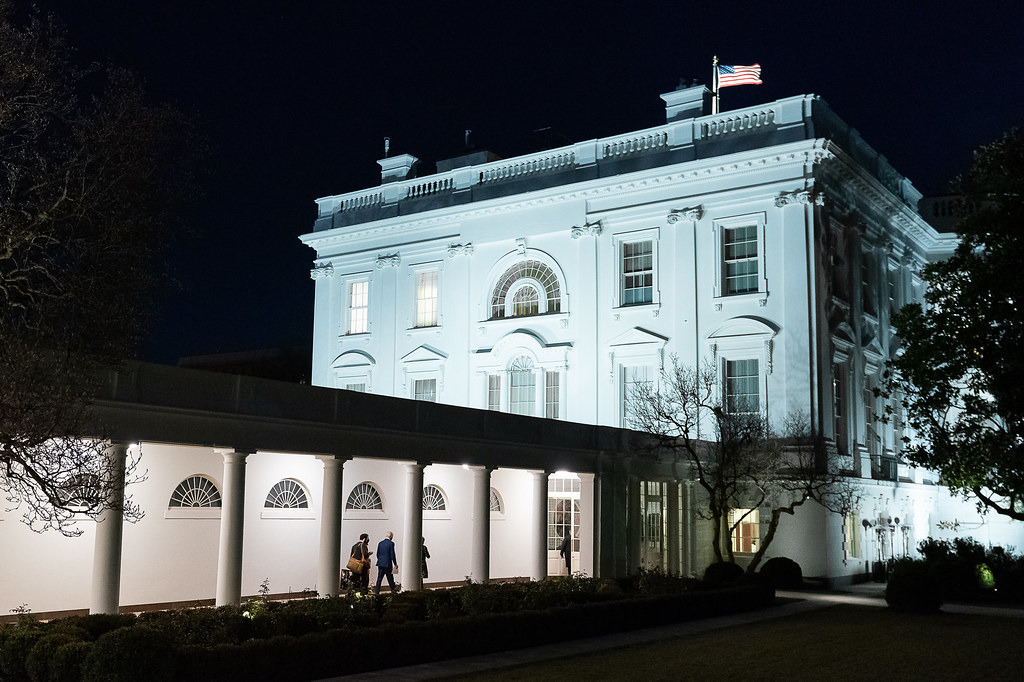
President Joe Biden and White House staff on the West Colonnade, January 2021. (White House /Adam Schultz)
 Political rhetoric pivots around key words or phrases that resonate with an audience and are evocative of deep-seated images and symbols. Among Americans the most potent are democracy and freedom.
Political rhetoric pivots around key words or phrases that resonate with an audience and are evocative of deep-seated images and symbols. Among Americans the most potent are democracy and freedom.
They are sprinkled liberally in public communications of any kind — spoken or written. They are used interchangeably. For, in the minds of many, they are shorthand for the legendary American experience.
Democracy and autocracy — those two words, hackneyed to the jaded, have received a new birth as the United States embraces the idea of a Cold War sequel.
Objectively, of course that is code for the contest for global primacy between the reigning hegemon (the U.S.)and the formidable challenge from China&/or Russia. That reality is expressed in the addition of the phrase “National Security.” Together they form a doctrinal iron triangle that crystallizes sentiment at home. In the wider world, “rules based international order” is substituted for “national security.” That rallying cry falls flat as the iron turns into rubber abroad.
The overriding purpose is to etch a stark line between “we” and “they.” The former encompasses the fellow liberal democracies cum allies of the North Atlantic area which is extended figuratively to the ANZUS countries, Japan and South Korea – the amalgam constituted as the Collective West.
The “they” is composed of China – above all — Russia, Iran, North Korea and whomever demonstrates either an affinity for the above or opposes Western designs and policies. They are seen as the “running dogs” of the threatening powers — Venezuela, Cuba, Nicaragua, Syria inter alia.
The Fluid Area of the Uncommitted

The new Ankara terminal is a hub for the high-speed rail services. (Metuboy, CC BY-SA 4.0, Wikimedia Commons)
Then there is that fluid and indistinct grey area occupied by the neutrals and uncommitted. The most strategically significant of these “independents” are Turkey, India, Brazil, Indonesia, Saudi Arabia, South Africa, Argentina, Pakistan. It has been the aim of the Biden administration to mobilize the maximum support possible among these states on matters of basing rights, energy commerce, finance, trade embargoes and boycotts.
Before the Ukraine crisis became acute in February of last year, the primary target was China. The emphasis was on containing the expansion of China’s global influence — pressing the argument that such a development constitutes a multiform menace to the national interests of other states and to global stability overall.
This abstract strategic formulation acquired sharper definition with the onset of the confrontation with Russia over Ukraine. Washington had provoked the conflict in the expectation of inflicting a mortal, politico-economic defeat on Putin’s Russia — eliminating it as a major factor in the grand equation of forces between “we” and “they.”
They moved quickly and decisively to draw an irreversible “line of blood” between Russia and the NATO/EU European countries. Deferential governments across the continent — from London to Warsaw to Tallin — enthusiastically fell into line. That instinctive display of solidarity conforms to the psychological dynamic of the dominant/subordinate relationship that has determined the Euro-American connection for the past 75 years. So deeply rooted, it has become second nature to political elites.
The extremity of the prerogatives granted the United States to act in disregard for European sovereignty and interests was demonstrated in Washington’s destruction of the Baltic gas pipeline.

Locations of the explosions caused by the Nord Stream attacks on Sept. 26. (Lampel, CC BY-SA 4.0, Wikimedia Commons)
That extraordinary episode punctuated the Europeans’ unqualified commitment to serve as an America satrap in its all-out campaign to prevent China as well Russia from challenging its hegemony.
Securing the obedience of the European economic power bloc undeniability represents a major strategic success for the United States. So does cutting off Russia’s access to capital investment, technology and rich markets to the West.
The heaviest costs are being paid, though, by the Europeans. In effect, they have mortgaged their economic future for the sake of participating in the ill-thought-through severing of all connection with what now is an implacably antagonist Russia whose abundant energy and agricultural resources have been a prime element in their prosperity and political stability.
In the eyes of the objective observer, Washington’s gains in Europe have been more than offset by the absolute failure to achieve its primary aim to gravely weaken Russia. The latter’s striking economic resilience (a complete surprise to poorly informed Western planners) left Russia not only standing, but in a healthier position — thanks to a series of beneficial reforms (above all, in the financial system) that auger well for the future.
New Network of Global Relations
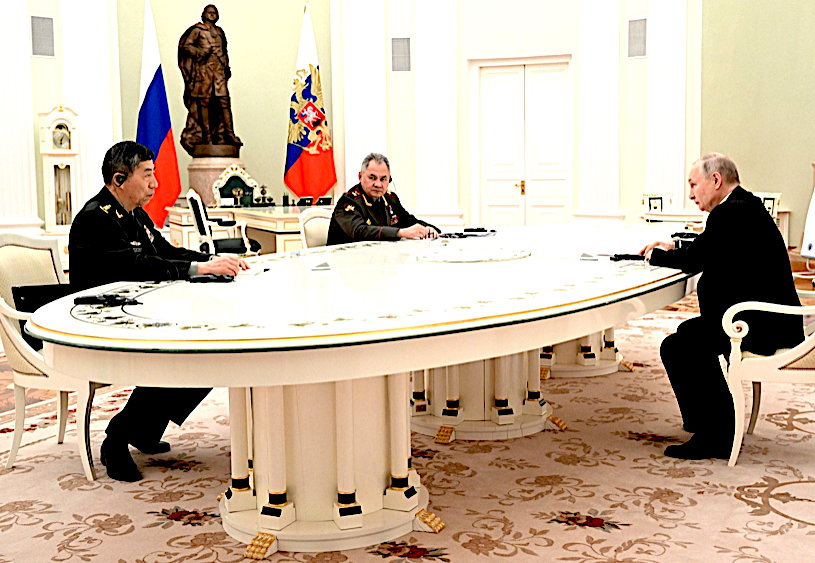
China’s Defence Minister Li Shangfu, on left, seated next to his Russian counterpart Sergei Shoigu and Russian President Vladimir Putin on April 16. (Pavel Bednyakov, RIA Novosti)
The West’s economic war has led to an accentuation and acceleration of a Russian program of reconfiguration largely unrecognized by analysts in Washington, London and Brussels. Sharply reduced vulnerability to external pressures, such as the misfiring American-led sanctions campaign, and the knitting of a new network of global economic relations, is the outcome. Indeed, Russia’s demonstrated strengths in design and manufacture of military hardware, along with its abundant natural resources, mean that its contribution to overall Sino-Russian power make it an all-the-more formidable rival to the American bloc.
The binary structure of the international system taking shape is easily accommodated by American elites and populace alike. A Manichean view of the world neatly fits the country’s self-image as Destiny’s child preordained to lead the world into the light of freedom and democracy.
Support CN’s Spring Fund Drive
Since it is an article of faith to Americans that the country was imbued with political virtue at its founding that any party who opposes them stands in the way of an incontrovertible teleology. It follows that a political entity that challenges American supremacy is not only a hostile threat to the United States’ security and well-being, but by that very fact, it also is morally flawed. Righteousness and denigration of foes readily mutes into their designation as “evil” incarnate.
The implications are profound. A conflictual relationship is presumed, co-existence deemed unnatural and fragile, diplomacy devalued and negotiation viewed as a poker game instead of horse-trading. Success becomes defined as victory that eliminates the enemy.
That attitude has been reinforced by the 20th century experience. Defeat of the Central Powers in WW I, the crushing of Germany and Japan in WW II, the collapse of the Soviet Union and the evaporation of international Communism.
Forgotten are the straightforward powers plays in the invasion of Mexico and the confiscation of its territories, the Spanish-American War, innumerable interventions and occupations in Central America and the Caribbean. The moral crusades of the next century facilitated the erasure memory of those profane events and the preservation of belief in the United States inherent virtue.

Poster of some those who were “disappeared” after the U.S.-backed 1973 coup by Augusto Pinochet in Chile of the Popular Unity government of President Salvadore Allende. (Razi Sol, CC BY-SA 2.0, Wikimedia Commons)
This continuity helps to explain the near unanimous, uncritical acceptance of Washington’s precipitous casting of Russia and China in the mold of past enemies. Thus, today’s Russia is viewed as the avatar of the Soviet Union, and China as posing an even more ominous danger that did Imperial Japan. Ignorance of far more subtle and complex realities is cultivated seemingly as an automatic preference for stereotypes that conveniently match American self-identity, subjective experience, philosophical conceptions, and national mythology. As a
consequence, we act on what are gross caricatures.
Russia is denounced as a tyranny under the ruthless rule of dictator Vladimir Putin. In truth, President Putin is the head of a collective leadership that receives highly favorable ratings from the populace, his copious writings and speeches provide no evidence of aggressive ambitions, and — despite political controls — there is a greater diversity of opinion on Ukraine expressed in the media and by popular Russian bloggers than there is in the United States or anywhere among our European allies. Considerably more than in Ukraine where draconian controls have been imposed.
China, too, is depicted in terms so warped and simplistic as to be almost cartoonish. The Beijing leadership’s clear vision of its prominent place in Asia — and beyond — bears no resemblance to Japan’s Co-Prosperity Sphere and empire-building. This should be evident to anyone with either a passing knowledge of Chinese history or reflection on its current activities. Yet, official Washington — and the near entirety of our foreign policy community — insists on accusing China as bent on belligerence and hostility toward the U.S. even as political leaders in Washington take the aggressive measures of flouting the half-century pledge to the One-China principle and promoting Taiwan independence.

Nancy Pelosi, left, visiting Taiwan’s legislature in August 2022 while she was serving as House speaker. (Wikipedia Commons)
That distorted vision has the Pentagon clamoring for a massive build-up of our naval forces in the Indo-Pacific region in expectation that the great sea battles of WW II will repeat themselves, while computerized war games have become an avocation. The theme music of “Victory At Sea” sounding in the background?
The extremity of efforts to paint Russia (and to a somewhat lesser extent China) as irremediable sinners who indulge in acts of criminality that qualify as war crimes express the American impulse to righteously judge others. This rash moralism is rooted in the theological dimension of its peculiar sense of “exceptionalism.”
It also serves a strategic political purpose in helping to marshal support for a “we vs them,” zero-sum game. A striking feature of the current Ukraine/Russia situation is that an objective observer must strain to find a compelling reason to lock oneself into so rigid position. Washington minds drenched in neo-con dogma and anxious about the durability of U.S. global hegemony lacks that objectivity and foresight.
The impulse to stigmatize the enemy is matched by the impulse to burnish the democratic credentials of the parties whom Washington is backing.
Ukraine is incessantly portrayed as carrying the banner of enlightened political values. President Volodymyr Zelensky is heralded as its bearer and honored in the hallowed halls of Congress and elsewhere.

Ukraine’s President Volodymyr Zelensky displaying a present from House Speaker Nancy Pelosi after his speech to U.S. Congress on Dec. 21, 2022. (C-Span still)
Yet, the manifest reality is quite otherwise. Ukraine is an authoritarian state — one infamous for its corruption. All parties other than that supporting the current government are banned; the media are totally controlled and permitted only to spout propaganda; the offices of any civic groups are shuttered, and not least — the neo-Nazi and similar intra-nationalist forces exercise disproportionate influence in the security services and the corridors of official power.
Some boldly display Nazi insignia emblazoned on their uniforms and statues are erected in the memory of Stepan Bandera, the wartime ally of the SS who directed mass murders of Nazi opponents.
Such is the power of rhetorical imagery, and so strong is the need for moralistic justification of a high-stakes power political ploy, that this glaring reality is collectively sublimated.
When we shift our attention from the bipolar dimension of the emerging world system to the wider arena that includes other states, the American values-based approach to designating friends and foes loses cogency. Indeed, it becomes a distinct liability.
For those countries neither accept the United States’ self-proclaimed conceit of being the cynosure of political virtue — at home and abroad — nor the demonization of countries with whom they have had productive, pacific relations. They do not base high-stakes strategic decisions on what Beijing is or is not doing to the Uighurs in Xinjiang.
Even U.S. Secretary of State Antony Blinken & Company recognize this basic fact of international life. Washington, therefore, is forced to make its appeals for allegiance in very practical, conventional terms. While it does lip-service to the “historic” struggle between “democracy” and tyranny, that facile formulation cuts little ice in Ankara, Delhi, Brasilia, Riyadh or other capitals.
Some are anything but bastions of freedom themselves (Saudi Arabia). Some are led by people who have suffered the pernicious effects of American support for anti-democratic opponents (Brazil’s President Lula da Silva, who was jailed by the autocratic Bolsonaro cabal favored by Washington); have close dealings with Moscow or Beijing on matters of paramount national importance (President Recep Erdogan in Turkey); or, while constitutionally democratic, prefer to apply the term in its less than pristine purity (Prime Minister Narendra Modi’s India).
The Case of India, in Particular
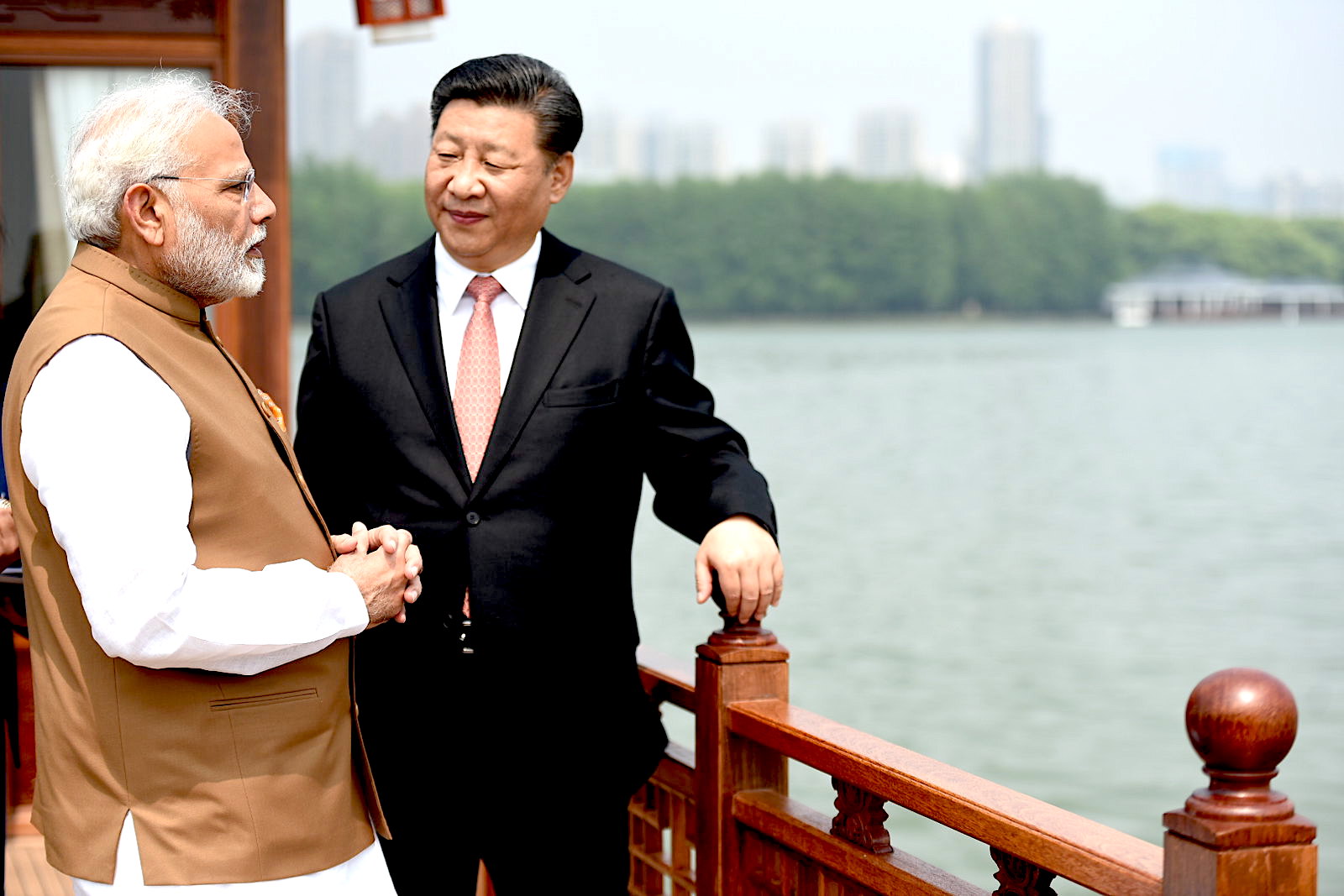
Indian Prime Minister Narendra Modi and Chinese President Xi Jinping in Wuhan, China. 2018. (MEAphotogallery, Flickr, CC BY-NC-ND 2.0)
India is a particularly instructive case. American strategists plotting their counter to the rise of Chinese strength presumed that they could engage India in an Entente Cordiale encompassing Japan, South Korea, the ANZUS and whomever else in the region they could entice or coerce into joining.
That hope always was vain; at least it was to analysts less obsessed with the China bête noir. Although relations between Delhi and Beijing had been chilly ever since the Himalayan war of 1962, and though India’s elites have felt an anxious sense of rivalry with a surging China, Indian leaders are committed to dealing with what has become a more complex relationship on their own terms and by their own means.
India is a civilizational state (like China) that harbors deep feelings of resentment at how the British Raj for 175 years subjugated them, exploited them and used India’s resources for their own strategic ends. Today’s self-confident India is not about to allow itself to serve as a subaltern in a perilous U.S. campaign to maintain its dominance in the Asian region.
Furthermore, in regard to Russia, the two countries historically have had close, mutually beneficial dealings — economic and diplomatic. It should have been no surprise that Delhi has spurned Biden’s demand that it join the project of isolating and punishing Moscow. Instead, it has done just the opposite.
India today is the second largest purchaser of Russian oil – a substantial portion of which is refined and sold on the international market at a handsome profit. Some goes to buyers in Western Europe including the U.K. Even the United States is a buyer of the trafficked heavy-grade Russian petroleum that it needs.
So, contrary to the standard U.S. and allied rhetoric that Russia has been isolated by the worId community, the awkward truth is that, to date, not a single government outside the Collective West has signed on to the U.S.-directed sanctions regime. Incessant claims that Russia is a global pariah that is being shunned and scorned, is obviously wrong. They pass muster only in the distorted echo chamber of Western officialdom and media.
US Forced to Communicate on Two Planes
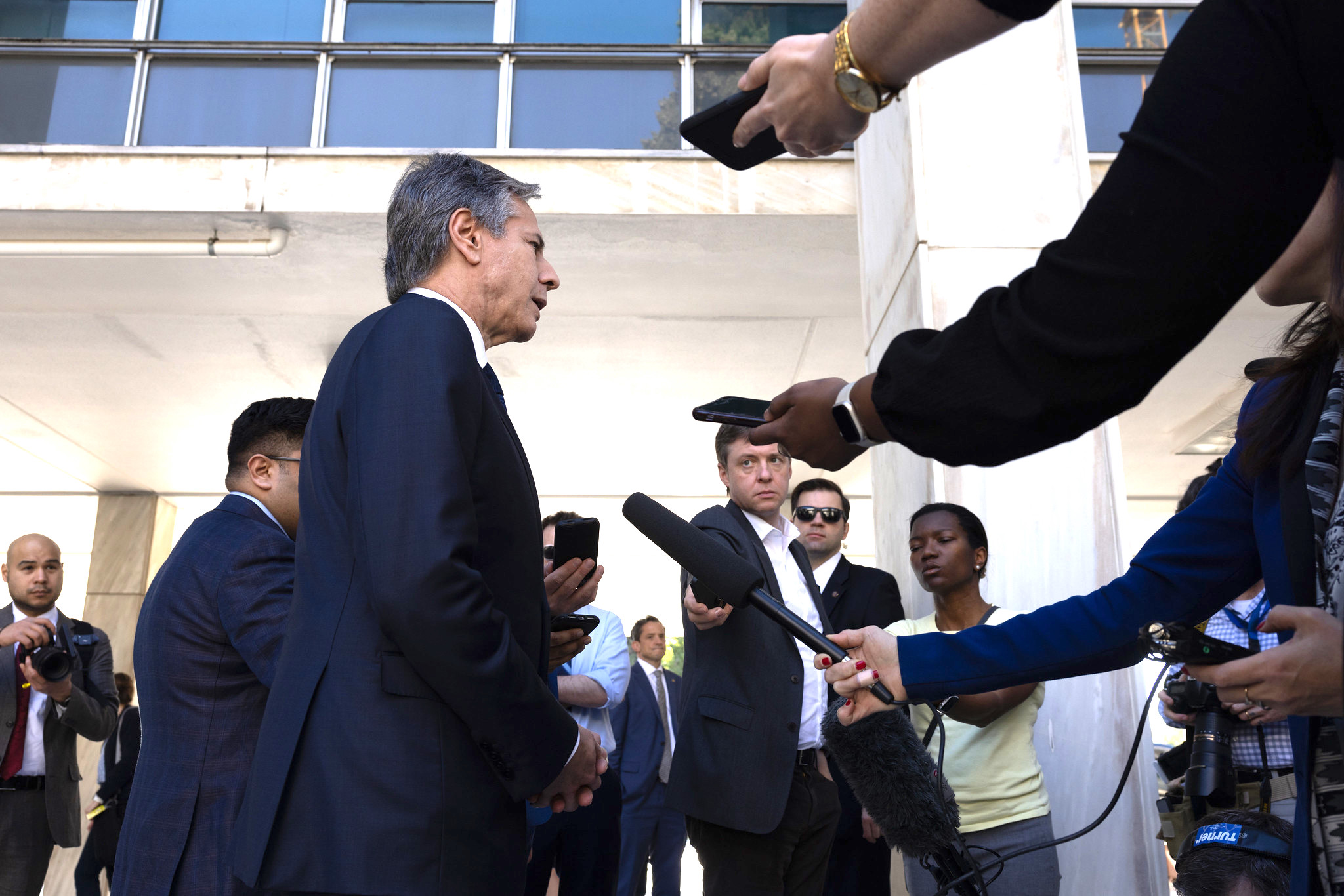
U.S. Secretary of State Antony Blinken speaking to the press in Athens on Feb. 21. (State Department/Chuck Kennedy)
These distinctive geostrategic and economic security priorities of these “independent” powers have obligated the United States to orient its approach and to fashion its rhetoric quite differently from that employed among the Collective West in its portrayal of Russia and China. In effect, it needs to think and to communicate on two planes. That is proving a daunting challenge.
It is not that the U.S. is alien to the traditional game of “realpolitik” and hard-nosed national interest. After all, it did so around the world for the 40 years of the Cold War. Rather, it is unconvincing when it crudely deploys arguments and pressure on “independent” states to associate themselves directly in a cause that poses risks and imposes tangible costs. Moreover, most see the U.S. cause as based on specious grounds – in both ethical and practical terms.
The American inventory of instruments to cajole or coerce remains impressive. However, the vulnerability of other parties is diminished by two, mutually reinforcing factors.
One is their own valued assets (be it oil, markets and commercial interdependence in a highly integrated global economy, or critical regional influence in sensitive areas — the Middle East).
The second are the options that have opened by the shift of the locus of world economic activity toward Asia and Euro-Asia. China itself is the world’s dominant manufacturing center by a wide margin. The country’s manufacturing sector is larger than those of the U.S. and the EU. Russia’s criticality as a principal source of energy and agricultural products, made manifest by the Ukraine affair, means that aligning with the severe strictures demanded by the United States exacts an intolerably high price.
Levers of Monetary Control
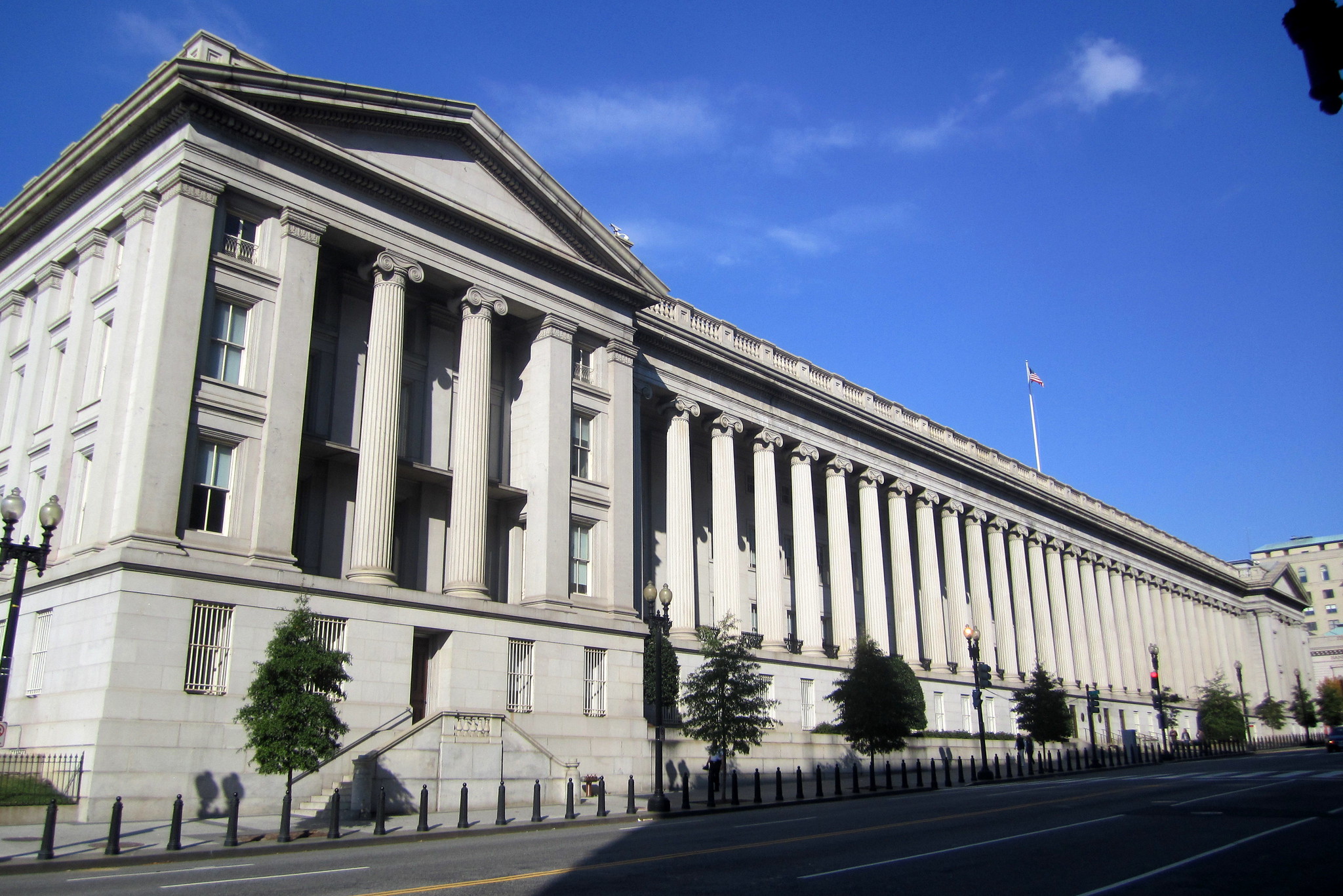
U.S.Treasury Department in Washington. (Wally Gobetz, Flickr, CC BY-NC-ND 2.0)
Washington can, and does, freely apply sanctions against any country that flouts its will. And, yes, it retains a stranglehold over financial transactions via SWIFT that acts as the international monetary clearinghouse. The dollar’s role as the world’s transaction currency forces others’ payments and reserves to pass through U.S. banks, and the de facto U.S. control of IMF lending.
These levers of influence are being used with growing frequency and in more dramatic ways. The starkest case in point is Washington’s arbitrary seizure of Russian reserves in the order of $300 billion. It is now hinting that the United States might take actual possession of the trove and dispense it for Ukrainian “reconstruction.”
There have been precedents regarding financial assets of Iran, Afghanistan and Venezuela (the last in conjunction with the Bank of England). But the unilateral anti-Russian move is of such a magnitude as to evoke concerns that the Americans could abuse its supposedly custodial monetary role to hold hostage the assets of any party that defies Washington.
That concern has prompted drastic action by Saudi Arabia, and others, to draw down their very large holdings in American financial institutions. The consequent spreading trend toward de-dollarization threatens a major pillar of the United States’ dominant global position. It is encouraged by the China-led plans already being implemented to create a set of alternative global monetary institutions.
Developments in the monetary sphere expose a fundamental flaw in the U.S. project to set “rule observance” as one of the key “values” for definitively classifying “good” and “bad” states. For the theft of another state’s monetary assets violates every rule, law, norm and standard practice in international dealings. The already thin credibility of Washington’s proposed formula cannot survive such blatant, self-interested unilateralism.
In the wake of the illegal invasion of Iraq, producing carnage and accompanied by widespread torture mandated from the White House, one might wonder whether the United States would be better off by simply claiming raison d’etat without the moralistic flourishes.
Everyone understands the former — even when disagreeing with specific actions — resent the latter.
Foreign policy driven by dogma, that mistakes shibboleths for ideas, whose audacious and grandiose ambitions defy reality is doomed to fail.
That leaves two open questions: 1) how much damage — direct or collateral – it will do en route to failure; 2) whether a fanatical pursuit of the unreachable will end in a cataclysm.
Michael Brenner is a professor of international affairs at the University of Pittsburgh. mbren@pitt.edu
The views expressed are solely those of the author and may or may not reflect those of Consortium News.
Support CN’s Spring
Fund Drive Today


Lovely meaty piece to sink a bit of morning loveseat coffee time into, Mr. Brenner! Thank you! Consortium works just keep getting more wonderful. I do not know how to get enough appreciation to all of you! (Fixed income.) But this continually fine work keeps us sane in a whacko world just now!
Please, could someone cover the WHO “Treaty” that is in parliament getting elbowed into international law!? This is another power grab by the willgates & big pharma nutcases.
Thanks again writers, editors, journalists, reporters! Let’s keep freedoms ringing and the writing-on and Free Julian Assange.
Having lived in USA for more than 25 years I realized that the people have NO VALUES except FOR MONEY. This is also the basice reason for Washington to expand it’s power WORLDWIDE & also the main reason for their wars as we see in the Middle East (OIL) Participating in World Wars I & II was NOT to fight the Germans/Russians but ONLY TO EXPAND THEIR GLOBAL POWER which Washington is not giving up as we see by the US military still OCCUPYING GERMANY, JAPAN, S. Korea, Middle East (Syria) & many nations in S.America & Asia. Although the people of these nations want them to leave. Washington offers these nations NO PROTECTION whatsoever but only uses their military OCCUPATION to control & subdue the domestic population!! YANKEE GO HOME is the slogan of these people in their FIGHT FO FREEDOM !!
Democracy & autocracy, remember, were the very terms bleated by mouth puppet Pelosi on her whirlwind tour of Taiwan. “Hackneyed for the jaded”? How about guileful for the poseurs?
Totally agree the underlying dilemma is us vs. theyism.
Reportedly… Pelosi’s daughter caring for that fading US Senate figure.
Rumor has that as seat saving for Adam Schiff… (Who BTW this commenter voted for before political awareness).
Now learn Prog Cal Governor Newsome prefers to nominate CA US Rep Lee… Not Schiff.
Uhhh… just speculating…
Brilliant and much needed articulation, Professor Brenner.
The key phrase is: “(a complete surprise to poorly informed Western planners).” The “lock” on U.S. policy makers’ thought being indispensibility and our actual enduring national nightmare-bringer, “exceptionalism.” Which is conceit. And that, dear fellows, remains but hubris, hubris, hubris. And after thousands of years of its remarkability, we all know how that always ends for the humanity that deigns to practice such.
Good, albeit in a sick way, that mention was made of the seizure of Russia’s $billions. It is indeed the linchpin of the U.S.’s rapidly decomposing pedestal upon which its modern notional identity rests, again albeit in a degraded ‘the luster has worn off’ manner.
For it serves to illustrate the most likely outcome of this entire misadventure, this enterprise of murder most foul on such a vast scale.
Why do I say this?
Because of that estimated $300 billion—and estimates vary widely—only $27 billion can be accounted for. This has been the case for at least six months now. Thereby serving up the perfect theme for this gathering, this stewpot of absolute corruption at play in what the collective Western power players have thus far wrought in the fields of the Ukraine, the planet’s prime host for it, already overflowing in aggrandizement. It’s like a flashing billboard, so bright is its light uncovering the darkness that thrives, squirming openly underneath the soil. Minerals, bacteria and viruses, our species reduced to its constituent elements for all the world to see. And to consider our actual relationship with “nature.”
“And to consider our actual relationship with “nature.””
Unfortunately David, i believe this is the least of their considerations.
I was trying to infer and entwine human nature with the very bugs and worms, etc in the soil itself. Both are essential life forms, but when humanity expresses or masquerades itself as any kind of creature of the soil, we’ve most definitely gone into retrograde. Ukraine, and those encouraging the enormous grift occurring there, are the worst possible expression of human nature.
Ok David. I get it now. I have a one track mind when “relationship with nature” is ever mentioned. And i wholly agree with your sentiments.
An analysis of the working of “Freedom and Democracy” show, consistently since 1917, that it favors the interests of the financial elite of the USA and their international dependents.
.
The closest parallel to Ukraine and Biden’s overthrow of democracy (by UkroNAZIs and CIA) in both 2005 and 2014 was the overthrow of Chile’s Allende by Nixon and Kissinger and Allende’s replacement by lovable Pinochet in 1974. While there was no Russian invasion in Chile, the US puppets Pinochet and Poroshenko/ Zelensky killed thousands of their countrymen. Of course Nixon (Kissinger) and Biden encouraged the slaughter. The US eventually abandoned Pinochet, however he was never convicted of a crime, was declared demented, and his massive money laundering and corruption schemes uncovered only after his death. Let’s hope the parallel doesn’t continue; Pinochet ruled Chile for 17 years, longest in Chilean history.
An excellent essay! I hope it’s widely read.
Given that the United States’ Deep State, through its primary tools, the Democratic Party and the corporate media, is doing to a huge segment of the United States electorate the same things that it is doing with respect to Russia, China, Iran, Syria, etc., I believe an important segment of the electorate is seeing through the very accurate description of traditional United States hypocrisy and dishonesty reflected in this article, and frankly, would much prefer obtaining real liberty and real democracy at home, rather than funding perpetual conflict abroad for the profit of investors in the military industrial complex against which Ike warned us 63 years ago. Of course, that epiphany may be futile if elections are no longer honest.
“Yet, the manifest reality is quite otherwise. Ukraine is an authoritarian state — one infamous for its corruption. All parties other than that supporting the current government are banned; the media are totally controlled and permitted only to spout propaganda; the offices of any civic groups are shuttered, and not least — the neo-Nazi and similar intra-nationalist forces exercise disproportionate influence in the security services and the corridors of official power. Some boldly display Nazi insignia emblazoned on their uniforms and statues are erected in the memory of Stepan Bandera, the wartime ally of the SS who directed mass murders of Nazi opponents.”
I haven’t submitted a letter to the editor of my local paper for some years now; perhaps I should and use the above quote. In the past, no matter what I wrote – even when I called for the arrest and trial of GW Bush et.al. for treason – were published. Interestingly, only one letter was not published, and in that one I documented the one-sided partisanship of Sinclair Broadcasting Co., their jaded reasons for buying up TV stations in political battleground regions (to harvest the bumper crop of political ad money,) and their virtual monopoly on consent manufacturing. My local TV station is owned by Sinclair; the paper’s Editor-In-Chief contacted me personally to offer some mealy-mouthed excuse why he would not print anything critical of another media outlet. Lo and behold that former Editor is now a reporter for that same TV station.
It is good to read an article from Michael Brenner: thanks CN.
US ‘values’…by any chance the same as ‘Western’ values?
So, none of this really matters as humans incrementally destroy the planet with our greedy, selfish, abhorrent behavior. Those in charge are like gangs in the streets – killing others just to prove who is more powerful. When we have no habitat, no planet, no life, will we still think we are the superior species – oh wait, we won’t be able to think because we will be extinct. Good riddance…
From the article:
“These levers of influence are being used with growing frequency and in more dramatic ways. The starkest case in point is Washington’s arbitrary seizure of Russian reserves in the order of $300 billion. It is now hinting that the United States might take actual possession of the trove and dispense it for Ukrainian “reconstruction.””
What a co-incidence:
“The German government is looking into mechanisms to secure war damages for Russia’s invasion of Ukraine, including the possibility of using Russian assets to compensate the country, a government spokesperson said.
Chancellor Olaf Scholz was among European leaders who agreed to set up a register of damages for the Ukraine war during a meeting in Reykjavik this week, Reuters reported.”
(17th May)
“Democracy v autocracy” has become a catchphrase. But the pattern of history is clear: wars are fought over interests not principles. “Democracies” ally with “autocracies” when it serves the interests of both. Yet few see the significance. More importantly, every empire in history has eventually faced the conflict it was trying to avoid – its own defeat. There is not much time to learn that lesson before we plunge into WW III. Because what we are witnessing now is not a Cold War sequel, but the early phase of the hot war the original feature was meant to prevent.
It was also Roman Shukhevych who was Commander-in-Chief of the Ukrainian Insurgent Army (UPA). These two gentlemen were to run amok in Volhynia and Galicia in western Ukraine in 1943-44. The object of their ethnic cleansing and mass murder was the Polish settlers who numbered hundreds of thousands.
It seems incredible that today that the Polish President, Andrzej Duda, welcomes Zelensky to his bosom as an anti-Russian patriot.
I have a video, entitled “Hatred – Murder of the Innocent” which tells the story of that genocide. 60,000 Poles were murdered by Ukranian nationalists under German occupation. It’s a very disturbing film. But it would appear humanity is doomed to kill itself with this “Hatred”.
Cold War II? A drone strike on the Kremlin seems mighty hot to me.
A remarkable piece. Far kinder than I would have been.
Brilliant analysis. Thank you!
Thank you. Amazingly coherent.
America is not a democracy. There are myriad proofs and examples of this, but I’ll offer just a single number. 67.
A democracy is a government where the people have the power. Lincoln’s bit of poetry was a good description … a government of the people, by the people and for the people. That is what democracy looks like.
The number 67 is the percent of Americans who feel the country is moving in the wrong direction (Ballotpedia Index of Polls, May 16, 2023). The percentage who feel that America is heading in the right direction is a tiny 22%.
In a democracy, a majority of the people would not be able to say that the country is moving in the wrong direction. Not for long, as a democracy would soon correct this. A government of the people, by the people, and for the people can not go in a direction that the people consistently say is the wrong direction. Yet, this has been a generally true poll result from Americans about America, administration after administration, unpopular Congress after unpopular Congress.
America is not a democracy. If America is going to war ‘for democracy’, then that is a lie. Which in modern America where the truth is rare if not extinct, is not really a big surprise.
So why do we keep voting for these people? We keep voting D/R, doing the same thing over and over and expecting different results – the definition of insanity – the fact is we get what we vote for, even though it is not what we want or need – Why? i ask this question all the time and get no answer other then TINA – there is no alternative – but there is and had been for decades …
So for whom do you vote?